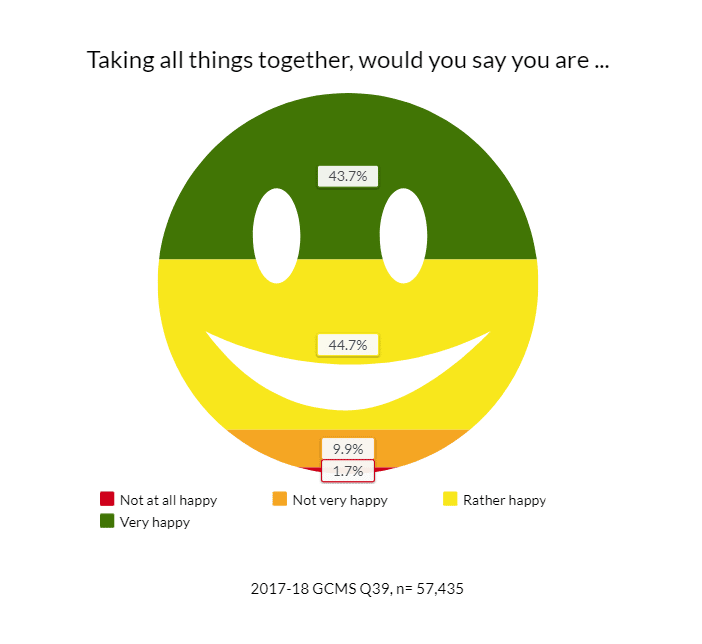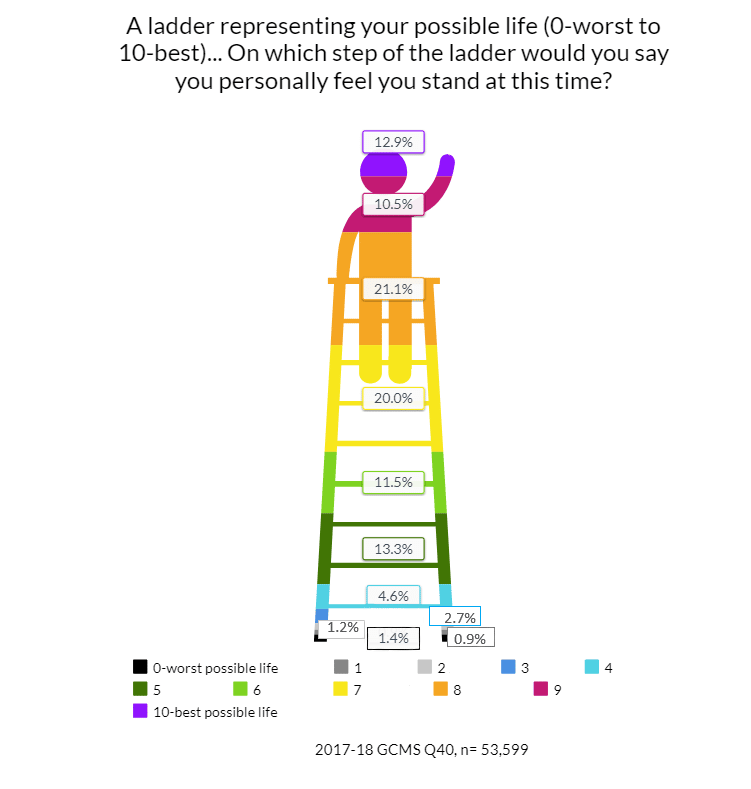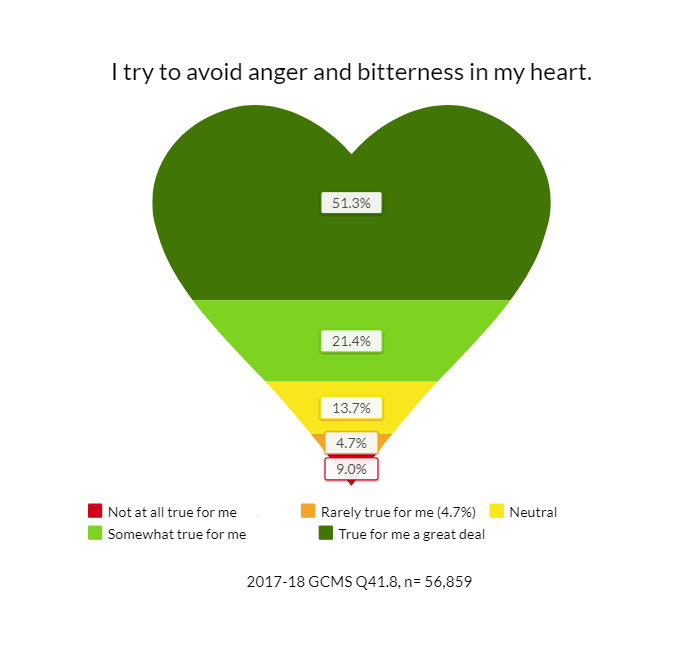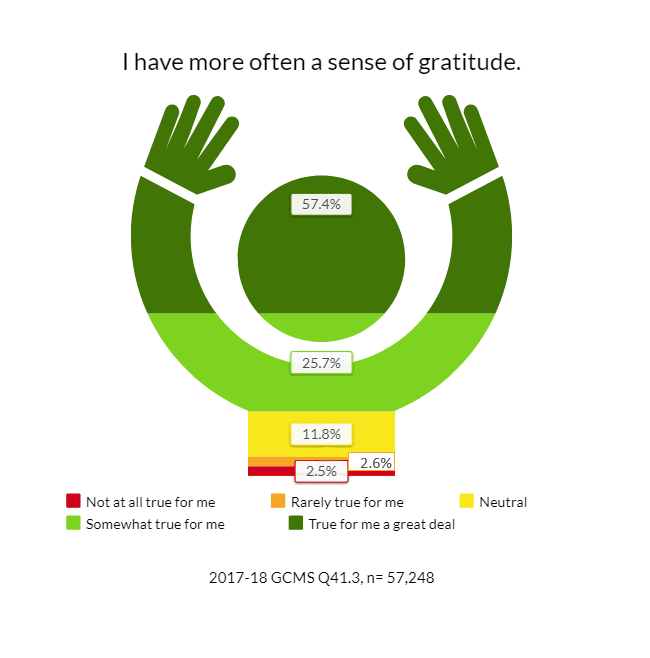Give thanks with a grateful heart
Give thanks to the Holy One
Give thanks because He’s given
Jesus Christ, His Son.
– Lyrics by Eustace Henry Jr. Smith
This chorus was sung at my church every week as a call to worship while I was growing up. While the words are simple, they reflect the gratitude and joy Christians experience because of the gift of Jesus. However, I wondered, are Adventists really happy, grateful people? The Global Church Member Survey 2017–18 (2017–18 GCMS) asked multiple questions that assessed not only members’ emotional state (i.e., happiness), but also their levels of gratitude.
Happiness and Well-being
Participants in the 2017–18 GCMS were asked to respond to this question: “Taking all things together, would you say you are very happy, rather happy, not very happy, not at all happy.” A vast majority (88%) of respondents reported that they were happy to one extent or another, with 44% of them expressing that they were very happy. Only a small percentage reported not being at all happy. For these respondents, it is clear that, “the joy of the Lord is [their] strength” (Neh. 8:10, KJV).

The respondents were then asked to imagine a ladder that represented their lives from worst (0) to best (10). They were then asked to rank where they stood on that ladder. Over three-fourths (76%) of the survey participants selected a 6 or above, indicating that their well-being was above average. Nearly a quarter of this (23%) ranked their lives as a 9 or a 10—meaning that they felt they were living their best life. Only about 1% said they were at the bottom of the ladder, the worst possible point of their lives. Another 10% ranked their life situation between 1 and 5.

Overall, these two questions revealed that the majority of Adventists reported high levels of happiness and overall well-being.
Anger and Bitterness
In Proverbs 17:22 (KJV), we read, “A merry heart doeth good like a medicine: but a broken spirit drieth the bones.” When we avoid holding on to negative feelings, such as anger and bitterness, we not only experience a happier existence, but our overall well-being improves. When 2017–18 GCMS survey respondents were asked if they tried to avoid such negative emotions, over half (51%) shared that they tried very hard to do so; another 21% said that this was somewhat true. Interestingly, 14% of respondents stayed neutral on this issue, and about 6% shared that they rarely tried to avoid anger and bitterness or did not try at all.

Research studies have shown that giving thanks (i.e., gratitude) may make you happier.[1][2] Thus, it makes sense that those who have a sense of gratitude feel happier or report better overall well-being. When the 2017–18 survey respondents were asked to respond to the statement, “I more often have a sense of gratitude,” a vast majority (83%) shared that this is true for them to one degree or another. Only one in ten (12%) respondents were neutral, and a small percentage disclosed they did not feel a sense of gratitude.

Overall, 88% of Adventists considered themselves happy people; over 76% ranked their well-being from 6 to 10 on a well-being 10-point scale. About 73% tried to avoid anger and bitterness in their hearts to one degree or another, and even more members (83%) felt gratitude in their hearts, although with a different frequency. Unhappy, unfortunate, angry, and not-feeling-grateful people composed a group of 1%-3%. Small as it is, this group should not be overlooked in the church. It might be that people from these categories were going through challenging periods in their lives and urgently needed compassion and help.
However, when you consider your own levels of happiness and well-being, do you find your gratitude reflected in those levels? What are some practical ways you can boost your gratitude? How can you rid your heart of anger and bitterness? Take some time to consider prayerfully what these factors might look like in your life . . . and don’t forget to “give thanks with a grateful heart!”
For more research findings on the total sample, please see the Meta-Analysis report.
Created in collaboration with the Institute of Church Ministry
Published by ASTR on 08-10-2022
[1] Emmons, R. A., & McCullough, M. E. (2003). Counting blessings versus burdens: An experimental investigation of gratitude and subjective well-being in daily life. Journal of Personality and Social Psychology, 84(2), 377–389. https://doi.org/10.1037/0022-3514.84.2.377
[2] Seligman, M. E. P., Steen, T. A., Park, N., & Peterson, C. (2005). Positive psychology progress: Empirical validation of interventions. American Psychologist, 60(5), 410–421.
Image credit: Friends eating photo created by katemangostar – www.freepik.com

